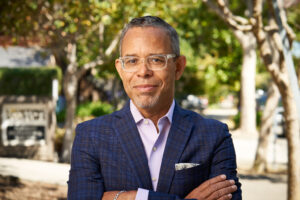David B. Vliet, MBA has been a pivotal figure in the Community Health Center movement since 2002, serving as CEO for three federally qualified health centers (FQHCs) and making significant contributions to the field, most recently at LifeLong Medical Care in California. His leadership and vision have played a key role in developing models of care for the elderly, driving workforce diversity and mentoring, and championing health equity, cementing his status as an extraordinary and influential advocate for health centers and the underserved. As he embarks on a new chapter, his dedication to improving access to care and his commitment to historically marginalized patients and communities will leave an immutable legacy.

At Advocates for Community Health (ACH), David’s vision helped establish ACH in 2021 as a market disruptor to meaningfully impact public policy, drive health equity and breathe new vision into the health center program.
“David truly embodies the mission of Advocates for Community Health, and we are incredibly fortunate to have his leadership, vision and expertise as a part of our founding and still to this day,” said ACH’s CEO, Amanda Pears Kelly. “His contributions to the health center program are invaluable and he is widely recognized for his work in health equity, supporting leaders of color across the movement with mentoring and greater vision across workforce diversity. David is a shining example of leadership excellence, not only through his expertise, but also by being a strong voice for historically marginalized patients and communities.”
David began his service in primary/outpatient care in 1994, including a five-year stint with the Nemours Children’s Clinic, a nationally recognized pediatric multispecialty health system. This is his second career, having worked in commercial insurance for a number of years before Hurricane Andrew hit. Called by a greater purpose during this time of emergency, David decided to return to school to obtain degrees in healthcare to pursue the development of a mobile clinic outreach model.
Today, David is on the brink of realizing a 37-year-old dream to start a non-governmental organization (NGO) in Latin America. As he prepares to retire from LifeLong later this summer, he is filled with anticipation and enthusiasm to finally be able to get this project underway, and he looks forward to the new challenges and opportunities that lie ahead.
We spoke to David about his legacy and his thoughts on the future of the health center program.
What are you most proud of during your career at LifeLong?
Overall, I am very proud of having been part of the CHC movement and the work I’ve done in expanding services in the health centers where I have served, with the important responsibility to impact the lives and well-being of the communities I’ve served. That’s what’s most important: people feeling and functioning well, being productive members of their communities, and taking care of themselves and their families. It has been a pleasure to serve in this model of care and to stand on the shoulders of the giants that helped create access to care for millions of people. It has been a wonderful experience to be a part of that work.
More recently, I am very proud of how we weathered the COVID storm together at LifeLong and negotiated some very difficult labor contracts, and the upgrades made to our operations infrastructure. The past four years have been incredibly challenging, and I think we’re in a position for greater stabilization post-COVID. Much work needs to be done to improve employee satisfaction and work-life balance because this is hard work, and the workforce has changed with generational shifts. We need to meet that challenge.
What does LifeLong Medical Care mean to the communities it serves? What would you like people to know about this wonderful resource?
LifeLong has an origin story rooted in taking care of seniors. We opened a PACE site, or Program of All-Inclusive care for the Elderly, a center focused on seniors, with our colleagues at the Santa Rosa Community Health Center last July 1, 2023 – a long-held dream by my predecessor, Marty Lynch, PhD. It’s a unique joint venture that speaks to our history with the Gray Panthers and our Over 60 Clinic, which has served seniors for decades.
To our communities, we represent the need for access to care, and we do that work diligently, day in and day out, year after year. I am very proud of our staff’s hard work and commitment to the communities we serve in Berkeley, Richmond, and Oakland, CA.
What would you say about the future of the health center program?
This is a significant moment in the history of the movement, and we must rise to it. The hue and cry of our workforce is that, while they love our communities, it’s very hard work that is not getting easier; in fact, it’s becoming even more challenging than ever before. Workloads are higher for everyone, as is the cost of living. How will we ensure pay equity and work-life balance within an economy that has seen increased cost of living over the past years? These are tough questions, along with the CHC movement sustainability in a largely fee-for-service model of care (PPS) instead of a care model that pays more for holistic care by care-based teams.
My hope is that we will adapt in order to ensure that folks can continue to enjoy working in our environment and continue to provide the high quality of care we’re known for. Additionally, we must continue to develop pathways to leadership that assure that we have future diverse leaders to carry on this incredible work and that we continue to be intentional in doing so. This is vital, and we must be on guard against burnout and lack of rest at the leadership level as well as the direct care level.
Ultimately, we’re resilient, innovative, flexible, adaptive, and committed in the FQHC world, and I know we will rise to meet these challenges.